THE FAMILY INTEGRATIVE SUMMER CAMPS
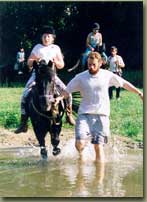
1996 - the program of the CEC's summer camps was awarded with a special diploma of the Moscow Government
1997 - Terentieva I.Y. Shpicberg I.L. Gurvich P.T. delivered a report "Ecosystematic Rehabilitation based on the Therapeutic Riding in the summer integrative camps" at the 9th International Congress in the TR (Denver, USA, July 19). The report covered a six year work of the Children Ecological Centre The Living Thread (CEC), and it was estimated by the audience.
1998 - the program of the Family Integrative Hippotherapeutic Summer Camps won the 1st place in the contest organised by the Moscow Govern-ment
We consider our experience in organisation and holding of the Therapeutic Riding based summer camps is valuable for those who intend to practise the TR or have been already practising it in their work with the disabled.
CEC has been organising its camps for 7 years. The first one was held in summer 1992 in a village Mesherskoe, Chekhovsky district of the Moscow region; during the last 6 years "The Living Thread" went to Kaluzskiy region Balabanovo.
The Moscow Family and Youth Committee, The Pensionary Fund support us, and moreover we receive financing from our sponsors.
By the way, during the last 3 years families of invalids paid 10% of charges (some of them receive a fanatical support at places of their work, others are helped by the municipal offices of the social protection and so on).
Our pedagogues and instructors equip the territory of a former pioneer camp so that it can be a summer home for the disabled, their families and horses, and the personnel of The Living Thread. Due to the common efforts of the personnel and parents there were built a stable and a parade-ground for the TR courses (on a former football field).
Usually such a camp passes in three terms, 16-17 days each.
An intensive summer course of the TR during is a logic culmination of the year cycle that is to deepen and confirm learning and skills chil-dren got during the main course. Additionally we provide a course of massage (everyday). But the camp serves as a beginning of the on-coming year as well. Our observation showed that for some children the maximum effect from the TR is most achievable during the summer camp. In case it is so, the city sessions are regarded as supportive till the next intensive camp course. This isn't an axiom, and, for example, for teenagers and adults with psychological impairments the city sessions are very necessary to maintain a certain rhythm that brings structuralitiy.
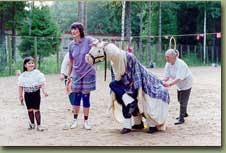
Apart from an intensive TR course, a camp can give a unique opportunity to attend different outdoor courses, on a parade-ground in group or individually. If necessary one can easily find a quite meadow to be alone for a while, or ride about the camp when everyone can just say hello to such a rider or to praise him/her; and one can just play a "mail" game delivering letters within the camp territory overcoming some obstacles on one's way (there is a river that is interesting to ford astride). One can ride through a wood or a village. And of course to shepherd horses, to bath them in a river, to do haymaking for horses - all this is possible only during the summer camp.
The presence of "normal" children in a camp makes it possible to create an integrative groups (a so-called groups where the disabled and able children are involved ). In addition to usual courses children have to look after a horses and to study hippology (a science of horse).
At the end of a term the children go to a small riding trip, and on the closing day they show a prepared performance. Each we had something different: either a fancy-dress riding with relay, or a chivalresque tournaments, or a dramatise horse fairy-tale etc.
Our camp also has a uniformed pedagogical program that includes the work in handicraft and art workshops. This work is concentrated on the rehabilitation of the distorted connections of a child with nature. It is important that children can see the results of their labour in workshops for many things that they make are used on the camp, for example, a rack for bridles, embroidered saddlecloths, dolls and fancy-dresses for the closing day performance and the like.
Every child in our camp has his/her own duties at the stable; from the very beginning of the term the schedule says to everyone one's turn to clean a stables and to feed horses. Children are free to visit the stable at any time during the day to spend some time with horses, to pat them, to give them a carrot, but, of course, all this they do under the supervision of an instructor or a groom on duty.
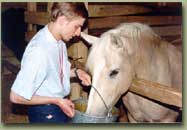
There are other animals in our camp such as goats, rabbits and the poultry. They too live in the stable. Most families brings their pets to the camp. On the first sight this isn't the most interesting moment of the camp life but it turns out that a communication with other animals is also very important for children-invalids. Especially for severely handicapped and autistic ones. Some time they have somewhat dramatic relationship with them - a child can fear the smallest baby bird as these animals seem to them like a strange and frightening world beings. It takes quite a few time to help a child in finding a contact with an animal, and this contact helps him/her to give a new look at the world around, a look that isn't so full of anguish, pain and loneliness.
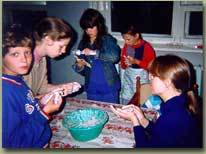
An integrative environment is one of the rehabilitative factor of the summer camp. The atmosphere of the camp knocks down the barriers be-tween the able and the disabled. Brothers and sisters of the disabled, the young assistants of the pedagogues (often they are about 14-15 years old) encompass the disabled maintaining their communication. This situation is quite a unique one, especially for people with severe physical and mental impairments as, back in the city, they most often are locked within four walls due to various circumstances.
We have a group of children with a very serious pathology for even special institutions and the rehabilitative centres reject them. During the year they have no possibility to go anywhere accept from our centre at the Hippodrome. For them the moment of such a communication is especially valuable for the friendship set up during the camp days between parents and children goes on back in the city, broadening their contacts, enabling these families to support each other.
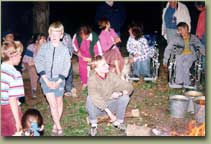
It is necessary for the parents of such a child to see that he/she is wanted, and unconditionally has an absolute value and the right to live life to the full in the eyes of other people (and very often it is youngsters not connected with the invalids through a problem in their own families).
Thus, apart from purely therapeutic result, the family integrative hippotherapeutic camps encourage families with children-invalids with a new forces for living on in the society.
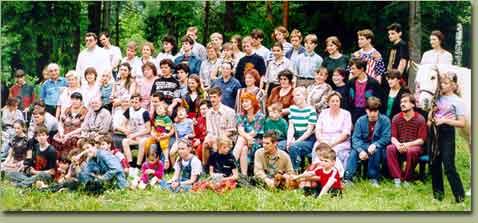
|